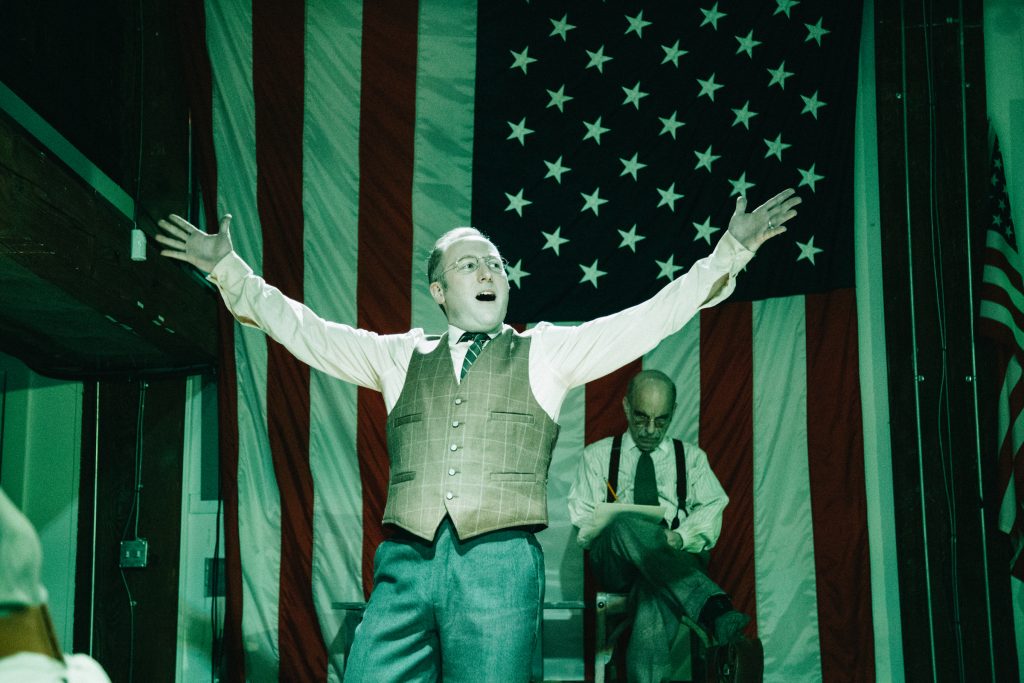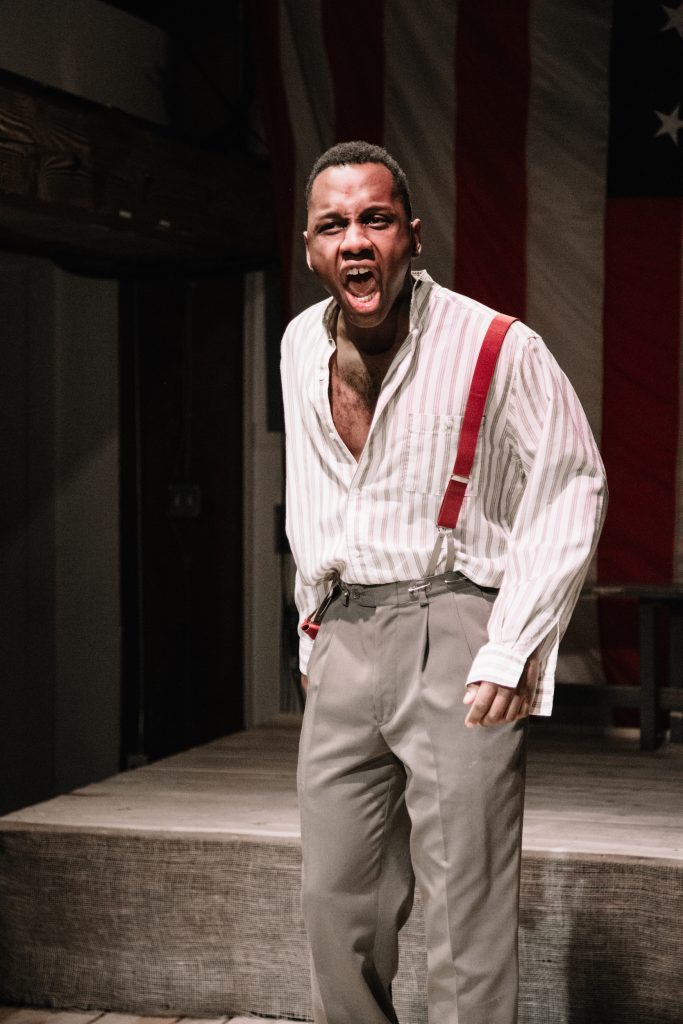
Credit: Nicol Spinola
191 Alexander Street to April 13, 2024
Sold Out
Posted April 4, 2024
If I’d gone to opening night instead of dragging my heels, I could have told you how fantastic Parade is in time for you to see it. The rest of the run – to April 13 – is sold out. But there is one positive: if you ever see an offering from Raincity Theatre again run, don’t walk, to get tickets. I won’t make the same mistake again.
Parade, with book by Alfred Uhry and music and lyrics by Jason Robert Brown, is based on the true and terrible story of Leo Max Frank, manager of the National Pencil Company Manufacturers in Atlanta, Georgia circa 1913. When the raped and bloodied body of thirteen-year-old factory worker Mary Phagan was discovered in the basement of the pencil factory, there were only two suspects: Leo Frank and Newt Lee, the African-American night watchman.

Credit: Nicol Spinola
What followed was a travesty of the American justice system all tangled up with local politics, a governorship up for grabs, still-fervent Southern pride, long-repressed hostility to Northerners and Jews, and newspapermen out for a good story. Leo Frank was a New York college graduate and a Jew; in the townspeople’s eyes, he had two strikes against him: he was both Jewish and Northern. Mob hysteria, then fury, took hold.
We know how Parade is going to end but watching it unfold evokes a mixture of curiosity and dread.
Obviously central to Parade is Leo Frank, portrayed by Josh Epstein of whom we don’t see nearly enough in this town. Although Frank is a bit cold and standoffish initially, Epstein eventually makes him so heartbreakingly vulnerable that by the time his character meets his end, we are achingly hopeful that what we know is going to happen, doesn’t. Epstein has a terrific voice, magnetic stage presence and in a very strange little scene, he simply exudes sexiness when we get to see Leo the way the prosecution paints him: a lascivious, predatory man.
Parade is also a love story. Leo’s wife Lucille feels unloved, yearns for a child and longs to be a full partner in the marriage. Leo keeps her at a distance until he is indicted and that’s when Lucille moves heaven and earth to prove his innocence. The night I attended Lucille was played by Erin Aberle-Palm and I cannot imagine anyone playing the part any better. Aberle-Palm, in gorgeous southern gowns (by Christina Sinosich), can break your heart with her sweeter-than-sweet voice and her beguiling manner.

Credit: Nicol Spinola
Under the direction of Chris Adams, it’s a large cast of twenty featuring Warren Kimmel as the celebrity-seeking lawyer for the prosecution; Stephen Aberle (Judge Roan), Richard Newman (lawyer for the defence), Tainui Kuru (Governor Slaton), Zac Bellward (Frankie), Alina Fenrick (Mary Phagan), Ivy Charles (Newt Lee) and Ricardo (as the villainous Jim Conley, whom historians believe was the actual murderer). The cast is completed by an ensemble of townspeople, factory workers and reporters. With a cast this large there’s bound to be weaker voices, weaker links but not in this Raincity Theatre production. It’s solid gold.
A seven-piece band, under the direction of Sean Bayntun, is perched high on a balcony above the performance area.

Credit: Nicol Spinola
The venue was new to me: 191 Alexander Street, built in 1910 for the Grand Trunk Pacific Coast Steamship Company. Lovingly restored, it features old-growth timber beams, the likes of which we will never see again; exposed hand-hewn brick; iron hardware; high ceilings. Seating capacity: 73. It’s the perfect venue for Parade with its opening scene set during the American Civil War but whose main events took place between 1913 and 1915. Set design by Ryan Cormack features so many Confederate flags that I felt I ought to be pledging allegiance to Old Dixie. It is such a sea of red, white and blue stars and stripes that it was felt necessary to say in the program notes, “Please note that the venue displays Confederate flags as part of the set decoration and is intended only for story purposes.” Apparently, passersby were curious especially in view of the fact that the Confederate flag has surfaced again in white supremacist rallies.

Set design: Ryan Cormack
Lighting design: Itai Erdal
Costumes: Christina Sinosich
Lighting by Itai Erdal makes excellent use of the space; and choreography by Nicol Spinola keeps this large cast moving around – seemingly effortlessly – in such a small space: a two-tiered, planked stage framed in burlap.
I accept that this view of Southerners is skewed; not all Southerners were antisemitic or racist or out for blood. But the story is true. And it took place in a specific period in American history – a scant fifty years after the defeat of the Confederate army. Many of the folks in the breakaway states still hoped that they would see, “Dixie rise again.” There remained hostility towards Northerners and especially Jews who ran many of the factories. Racism against African Americans was rampant now that slavery had been abolished. Many freed slaves were impoverished.
It was a hotbed of antagonisms. All that was needed was a catalyst and the brutal rape and murder of a young girl was all it took to whip the community into a frenzy of intolerance.
Parade is up there with Sweeney Todd and Cabaret: dark, nasty musicals that are strangely compelling. In the past, Raincity Theatre has produced both of those plus Company. This company seems to favour odd, small venues where the performers are in your face, almost stepping on your toes. I’m hoping next up might be Stephen Sondheim’s Assassins, another wicked, gripping musical. And I won’t wait until the run is halfway through and the show is sold out before reviewing it.

